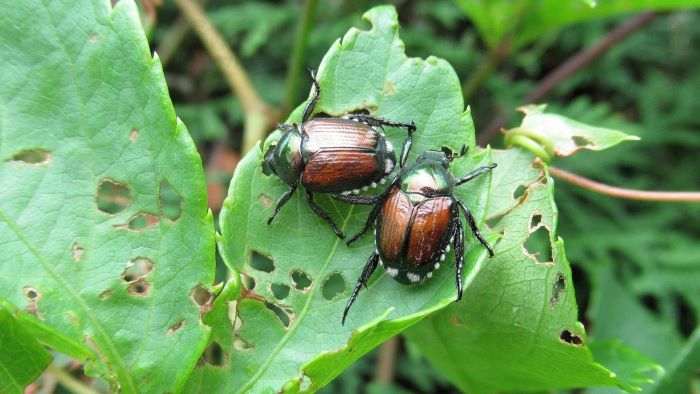If you love gardening, you know how rewarding it can be to grow your own food and flowers. But, you also know how annoying it can be to deal with pests that can ruin your plants. You may be tempted to use chemical pesticides that can kill the pests, but also harm the environment and your health. But there is a better way to carry out garden pest control procedures.
In this blog post, we will show you some garden pest control tips, which will help you protect your home garden from pests. Whether you have aphids, caterpillars, beetles, or slugs, we have a solution for you.
So, keep reading and learn how to enjoy your garden without any hassle. 👇📚🌻
Contents
- 1 Garden Pest Control Tips
- 1.1 1. Maintain Healthy Soil and Plants
- 1.2 2. Encourage Natural Predators and Beneficial Insects
- 1.3 3. Use Natural or Organic Pesticides
- 1.4 4. Rotate Your Crops
- 1.5 5. Handpick and Dispose of Large Pests
- 1.6 6. Avoid Overcrowding the Plants
- 1.7 7. Choose Pest-Resistant Plants
- 1.8 8. Prune Infested Plants
- 1.9 9. Seek Professional Help if Needed
- 2 FAQs
- 3 Well, It’s a Wrap!
Garden Pest Control Tips
Gardening is a rewarding hobby that can provide you with fresh produce, beautiful flowers, and a sense of accomplishment. However, it can also be frustrating when your plants are attacked by pests that can damage or destroy them. Fortunately, there are some easy and effective ways to control garden pests without harming the environment or your health.
Here are some tips to help you keep your garden healthy and pest-free.
1. Maintain Healthy Soil and Plants
One of the best ways to prevent pest problems is to keep your soil and plants healthy and strong. Healthy plants can resist diseases and pests better than weak or stressed ones. To maintain healthy soil, you should:
- Add organic matter such as compost, manure, or mulch to improve its structure, drainage, fertility, and microbial activity.
- Test your soil pH and nutrient levels regularly and adjust them as needed with lime, sulfur, or fertilizers.

- Avoid tilling or digging the soil too often or too deeply, as this can disturb the soil life and expose weed seeds.
- Water your plants deeply and infrequently, rather than shallowly and frequently, to encourage deep root growth and drought tolerance.
- Weed your home garden regularly to prevent competition for water, nutrients, and space.
2. Encourage Natural Predators and Beneficial Insects
Another way to control garden pests is to attract and support their natural enemies, such as birds, bats, frogs, lizards, snakes, spiders, ladybugs, lacewings, parasitic wasps, and predatory mites. These creatures can help you reduce the population of harmful insects such as aphids, caterpillars, beetles, leaf hoppers, scale insects, and spider mites. To encourage natural predators and beneficial insects in your garden, you should:
- Provide them with food sources such as nectar-rich flowers, seeds, fruits, or suet.
- Avoid using chemical pesticides that can harm them or disrupt their balance.
- Provide them with water sources such as birdbaths, ponds, fountains, or shallow dishes.
- Provide them with shelter sources such as birdhouses, bat boxes, rock piles, brush piles, or hollow logs.
3. Use Natural or Organic Pesticides
Sometimes, despite your best efforts, you may need to use pesticides to control severe pest infestations. However, you should always choose natural or organic pesticides that are less toxic to humans, animals, plants, and the environment than synthetic ones. Some examples of natural or organic pesticides are:
- Insecticidal Soap: It is a solution of water and soap that can kill soft-bodied insects such as aphids, mealybugs, white flies, and thrips by dehydrating them.
- Neem Oil is an extract from the neem tree that can repel or kill insects such as caterpillars, beetles, mites, and fungus gnats by disrupting their growth and reproduction.
- A powder made from fossilized algae that can kill insects with exoskeletons, such as ants, fleas, cockroaches, and slugs, by cutting their bodies and causing them to dry out.
- Bacillus Thuringiensis (Bt): A bacterium that can kill caterpillars by producing a toxin that paralyzes their digestive system.
You should always follow the label instructions carefully when using natural or organic pesticides. Apply them only when necessary, and in the right amount. You should also avoid spraying them on beneficial insects or pollinators such as bees and butterflies.🔎
4. Rotate Your Crops
Crop rotation is the practice of growing different types of crops in the same area in different seasons or years. This can help you prevent garden pest problem by:
- Breaking the life cycle of pests that are specific to certain crops or families of crops.
- Reducing the buildup of pests in the soil or on plant residues.
- Enhancing the diversity of plants and microorganisms in the soil.
- Improving soil fertility and health by adding different nutrients and organic matter.
For example, if you grow tomatoes in one spot this year, you can grow beans in the same spot next year. This way, you can avoid tomato horn worms that feed on tomato plants but not on bean plants. You can also enrich the soil with nitrogen from the bean plants that tomato plants need.🍅🌱
5. Handpick and Dispose of Large Pests
Sometimes, the simplest way to control garden pests is to handpick them and dispose of them manually. This method works well for large pests that are easy to see and reach such as snails, slugs, caterpillars, beetles, and hornworms. To handpick and dispose of large pests, you should:
- To remove them from the plants, wear gloves and use a tool such as tweezers, a knife, or scissors.
- Drop them into a bucket of soapy water or alcohol to kill them.
- Bury them in the ground or throw them in the trash.
- Do this regularly and early in the morning or evening, when the pests are more active.

6. Avoid Overcrowding the Plants
Overcrowding the plants can create a favorable environment for pests by:
- Reducing air circulation and sunlight can prevent fungal diseases and insect infestations.
- Increasing the humidity and moisture that can attract mold, mildew, and slugs.
- Providing more food and hiding places for pests to multiply and spread.
To avoid overcrowding the plants, you should:
- Space them according to their mature size and growth habit.
- Thin them out if they are too dense or leggy.
- Prune them if they are too bushy or sprawling.
7. Choose Pest-Resistant Plants
Another way to control garden pests is to choose plants that are naturally resistant or tolerant to pests. These plants can either repel, deter, or survive pest attacks better than other plants. Some examples of pest-resistant plants are:
- Marigolds: These flowers can repel nematodes, aphids, whiteflies, and other insects with their strong scent and color.
- Garlic: This vegetable can deter rabbits, deer, moles, and other animals with its pungent smell and taste.
- Basil: This herb can ward off mosquitoes, flies, and other insects with its aromatic oils and compounds.
- Tomatoes: These fruits can resist diseases such as blight, wilt, and mosaic virus with their genetic traits and adaptations.
When choosing pest-resistant plants, you should also consider their suitability for your climate, soil, and growing conditions.🌡️
8. Prune Infested Plants
Pruning is a process of cutting off unwanted or damaged parts of a plant such as branches, leaves, flowers, or fruits. This can help you control garden pests by:
- Removing the infested parts that can harbor pests or spread diseases.
- Improving air circulation and sunlight can discourage pests from settling on the plant.
- Stimulating new growth that can replace the lost parts or improve the plant’s appearance.
To prune infested plants, you should:
- Use a sharp and clean tool such as a pruner, a shear, or a saw to make clean cuts.
- Cut off the parts at an angle or just above a bud or a branch to avoid leaving stubs or wounds that can invite pests or diseases.
- Avoid pruning too much or too often, which can weaken the plant or reduce its yield.

9. Seek Professional Help if Needed
Finally, if none of the above methods work for you or if you have a serious pest problem that is beyond your control. Then you may need to seek professional help from a qualified pest control service. A professional pest control service can:
- Identify the type and source of your pest problem accurately and efficiently.
- Provide you with customized and effective solutions, which will suit your needs and budget.
- Use advanced tools and techniques that can eliminate your pest problem safely and thoroughly.
- Give you advice and tips on how to prevent future pest problems.
To seek professional help from a pest control service, you should:
- Do some research and compare different options based on their reputation, experience, price, and guarantee.
- Contact them and schedule an appointment for an inspection and an estimate.
- Follow their instructions and recommendations before, during, and after the treatment.
- Monitor the results and report any issues or concerns promptly.
FAQs
How can I protect my garden from diseases?
You can protect your garden from diseases by choosing disease-resistant plants, maintaining healthy soil and plants, avoiding overwatering and overcrowding, removing diseased parts and debris, and applying natural or organic fungicides if needed.
What are common ways to control plant pests and diseases?
Some common ways to control plant pests and diseases are encouraging natural predators and beneficial insects, using natural or organic pesticides, rotating your crops, handpicking and disposing of large pests, and pruning infested plants.
What helps prevent pests and fungus on plants?
Some things that help prevent pests and fungus on plants are improving the air circulation and sunlight, reducing the humidity and moisture, spacing the plants properly, weeding the garden regularly, and mulching the soil.
Does baking soda stop fungus on plants?
Baking soda can stop fungus on plants by creating an alkaline environment that inhibits fungal growth. However, it can also damage the plant tissue if used too much or too often. Therefore, it should be used with caution and diluted with water.
Well, It’s a Wrap!
Garden pest control is not easy, but it is not impossible either. By following these easy and effective tips, you can enjoy your garden without worrying about pests. Remember to always use natural or organic methods whenever possible and seek professional help if needed.
Happy gardening! 🌱🌻🐞

Hi, I’m Jacqueline, the editor-in-chief of cozynest. I have a passion for plants and gardening, also, have a degree in horticulture from the University of California, Davis. I love to share my knowledge and experience with our readers and help them create beautiful and healthy gardens, indoors, and outdoors. I also enjoy experimenting with different plant varieties, designs, and techniques, and learning from other experts in the field. When I’m not working on cozynest, you can find me in my own cozy nest, surrounded by my favorite plants and books.

